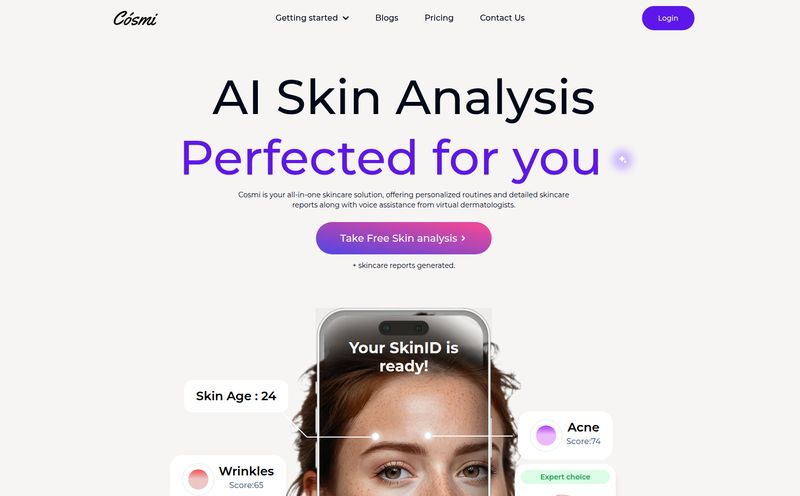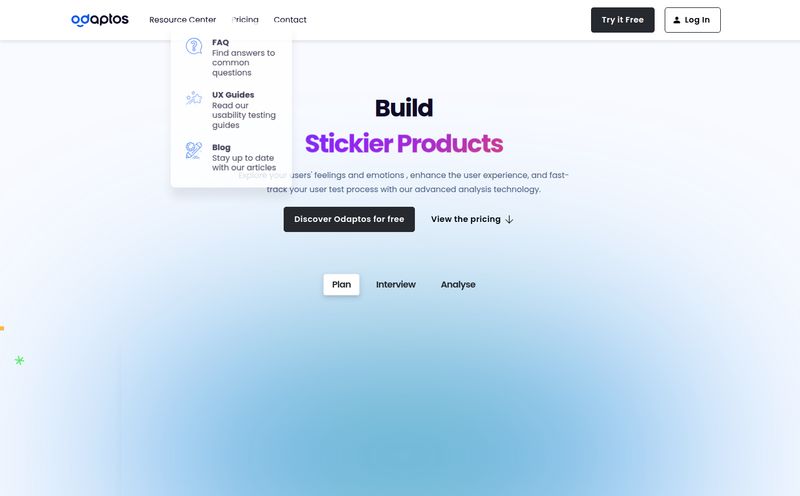If you pop "YouOrMe" into Google right now, you might land on a website selling some surprisingly chic bar stools and modern dressers. For a second, I thought I’d stumbled into a bizarre pivot. A furniture company moonlighting as a tech developer? Weirder things have happened in the startup world, I guess.
But no, that’s not what we’re talking about today. We're digging into the other YouOrMe. The one that’s been popping up in conversations, the one that promises to use the cold, hard logic of AI to settle that age-old family argument: does the baby look more like mom or dad?
For as long as I can remember, family gatherings have been the stage for this debate. "Oh, he has your chin!" "No, no, those are definitely her eyes." It’s a lovely, harmless tradition. But as a tech and data guy, the idea of an app claiming to have the definitive answer? My curiosity was definitely piqued.
So, What's the Big Deal with this YouOrMe App Anyway?
The premise is brilliantly simple. YouOrMe is an app that uses facial recognition AI to analyze a photo of a child and compare it to photos of their two parents. It then spits out a percentage-based score, crowning one parent the genetic victor. At least, in the looks department.
It's designed to be a bit of fun, a modern twist on a classic parlor game. Instead of holding dusty photo albums side-by-side, you're letting an algorithm do the heavy lifting. It taps directly into that universal human desire to see ourselves in our family, to find a piece of our story written on our face.

Visit You or me App
How Does This AI Magic Actually Work?
Without getting too bogged down in the technical weeds, the technology here isn't exactly groundbreaking—it's just a clever application of stuff we already use every day. Think about how your phone unlocks with your face or how social media automatically suggests tags for your friends in photos. That's facial recognition in action.
The app likely maps key facial landmarks—the distance between your eyes, the shape of your nose, the curve of your jawline, and dozens of other little points. It creates a sort of digital fingerprint for each face. Then, it compares the child's 'fingerprint' to the parents' and calculates the similarity. It's less of a DNA test and more of a geometric puzzle. A very, very complex one.
The process for the user is dead simple:
- Upload a clear, front-facing photo of the child.
- Upload similar quality photos of each parent.
- Hit the button and wait for the AI to deliver its verdict.
Easy peasy. But the simplicity of the process hides some pretty important questions about what's going on behind the curtain.
The Good, The Bad, and The "Hmm, Really?"
Like any viral tool, YouOrMe has its high points and its... well, its points of caution. I’ve spent years looking at trends and traffic, and I can tell you that apps like this succeed because they hit a perfect sweet spot of curiosity, ease-of-use and shareability. But that doesn’t mean we shouldn't look closer.
The Fun Factor is Undeniable
Let's be honest, the biggest draw here is the sheer entertainment value. It’s a fantastic little tool to whip out at a family dinner or to finally get a 'real' answer in a friendly squabble with your partner. The percentage score adds a fun, competitive edge. Seeing a result that says "72% Mom, 28% Dad" feels so much more official than Uncle Jerry’s opinion after his third glass of wine. It's easy, it's quick, and it gets people talking. And in today's world, that's a win.
Let's Talk About Accuracy and Privacy
This is where my professional skepticism kicks in. First, accuracy. The app's results are only as good as the photos you feed it. A picture of Dad from 10 years ago with a beard and terrible lighting isn't a fair comparison to a well-lit, current photo of Mom. For best results, you need photos with similar lighting, angles, and expressions. Even then, the result should be taken with a huge grain of salt. This is for laughs, not for a court case.
But the bigger conversation we need to have is about privacy. Facial recognition is a sensitive topic, and for good reason. Whenever you upload a photo of yourself—or worse, your child—to a free app, you need to ask yourself a critical question: what’s the business model? The old saying, "If you're not paying for the product, you are the product," often holds true. Your facial data is incredibly valuable. Is it being stored? Is it being used to train other AI models? Is it being sold to third parties? The information provided about the app mentions "potential privacy concerns," and that's a polite way of putting it. Always, always read the privacy policy before you upload your face. It might be less fun than getting the results, but it's a heck of a lot more important.
Uploading your photos to a free app can be like sending a message in a bottle – you don't really know where it's going to wash up. It's something I've seen time and again with viral apps that explode in popularity, as discussed in a piece by the Electronic Frontier Foundation on app privacy.
So, Is the YouOrMe App Worth Your Time?
My verdict? Sure, with caveats. If you approach it as a digital party trick, a novelty to share with friends and family for a good laugh, then go for it. It's a fun, modern way to engage with a timeless question.
However, if you're looking for a scientifically valid answer or if you're (rightfully) cautious about your digital privacy, you might want to pause. The lack of clear pricing information suggests it's free, which puts the onus on you, the user, to figure out how the company is making its money. Never give away sensitive data, especially biometric data like your face, without understanding the trade-off.
It's a perfect example of modern technology: fun, accessible, and just a little bit creepy if you think about it too hard.
Frequently Asked Questions
- Is the YouOrMe app scientifically accurate?
- Not at all. The app is purely for entertainment purposes. Its facial recognition algorithm compares visual features, but it's not a genetic or DNA analysis. Think of it as a high-tech guessing game.
- How much does the YouOrMe app cost?
- Based on available information, the app appears to be free to use. However, users should be cautious with 'free' apps and investigate their privacy policy to understand how their data is being handled.
- What kind of photos give the best results?
- For the most 'accurate' fun result, use clear, front-facing photos of the child and both parents. Try to use pictures with similar lighting, no glasses or hats, and neutral expressions.
- Are there privacy risks with the YouOrMe app?
- Yes, as with any app that uses facial recognition, there are potential privacy risks. It's crucial to understand what the company does with your photos and data. Are they stored securely? Are they sold or shared? Always read the terms of service and privacy policy.
- Wait, is YouOrMe an app or a furniture store?
- This is a point of confusion! There is a furniture e-commerce website operating under the domain youorme.com. The facial recognition tool we've discussed is a separate app that shares the same name. Always ensure you're downloading or accessing the correct platform.
Final Thoughts
The YouOrMe app is a fun little piece of tech that perfectly captures the current AI zeitgeist. It's a little bit of magic, a little bit of data, and a whole lot of fun for a family argument. Just go in with your eyes open. Enjoy the results, share the laughs, but don't treat it as gospel. And maybe, just maybe, give that privacy policy a quick scan before you upload your kid's face. After all, some family debates are better left unsolved.
References and Sources
- For more on app privacy: Electronic Frontier Foundation - Privacy
- Understanding Facial Recognition: WIRED - What Is Facial Recognition?
- The unrelated furniture store: youorme.com (Note: this appears to be an e-commerce site, not the app discussed).



